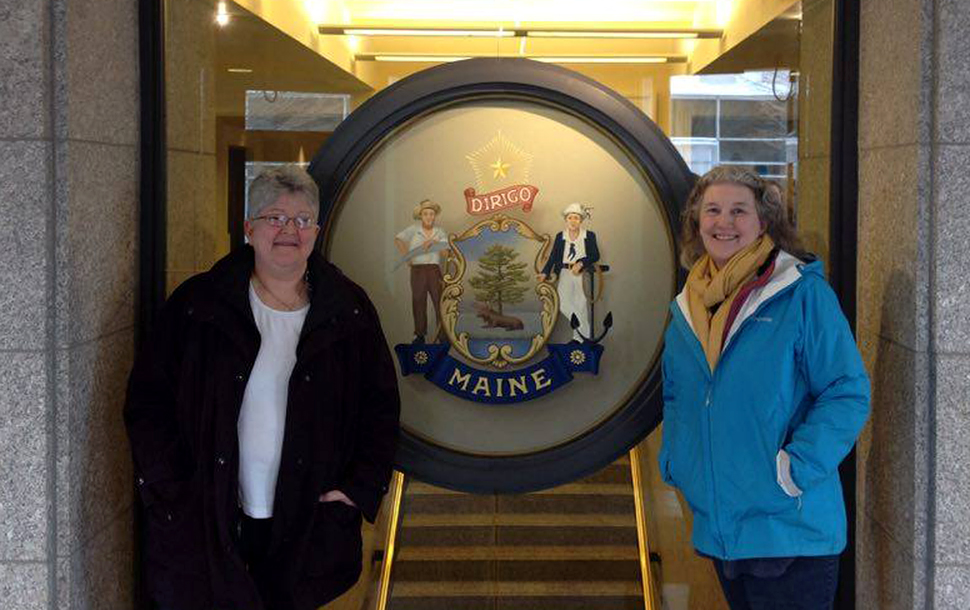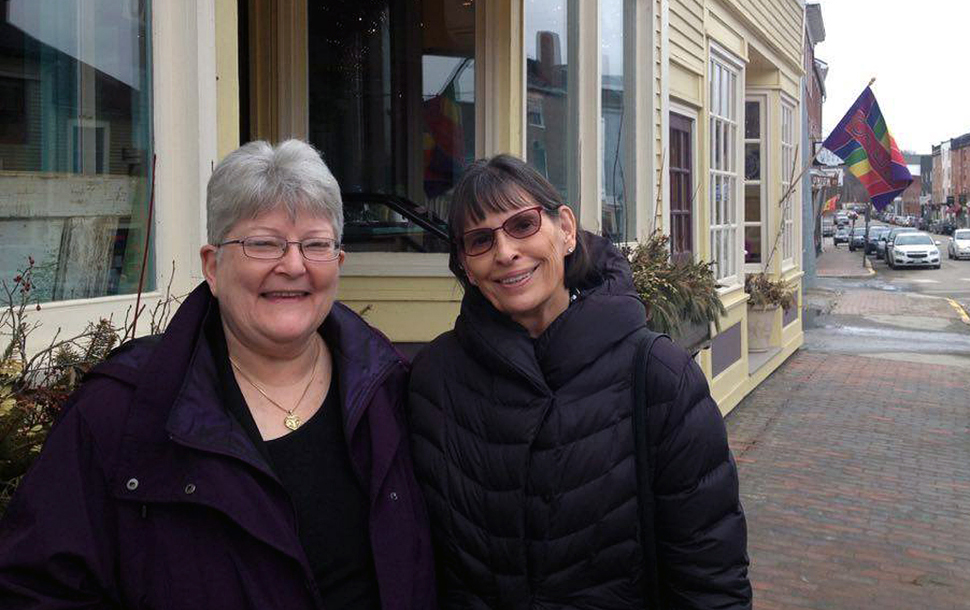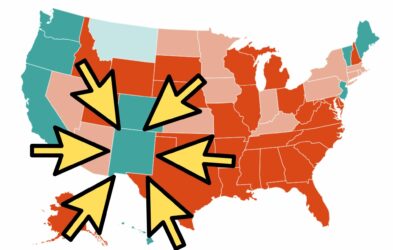This is the fourth in a series of interviews with grassroots advocates who are participants in Death with Dignity National Center’s State Leadership Incubator. Today, we’re speaking with Valerie Lovelace, founder of It’s My Death in Maine (now Maine Death with Dignity).
Other stories in the series:
- “Personal Liberty and Choice: Ed Tiryakian on Advocating for Death with Dignity in North Carolina”
- “The Right Side of History: Cindy Merrill on Advocating for Death with Dignity in Texas”
- “The Power of Coming Together: Lisa Vigil Schattinger on Advocating for Death with Dignity in Ohio”
*
On a January day in 2009, Valerie Lovelace came face-to-face with death.
As she sat at her younger sister Dee’s bedside, Val knew that she would witness Dee take her final breath, and her painful battle with cancer would come to an end. Dee was just 49 when she died.
Val grieved her sister’s loss, but also had what she calls a “deep and profoundly healing experience” in the wake of Dee’s passing.
“Having my sister die in my arms really changed me profoundly,” Val says.
Death and Dying from a Holistic Perspective
She began to explore issues of death and dying from a holistic perspective. As a Reiki Master and homeopathic practitioner, Val had experience providing care that complemented traditional medical methods.
As a hospice volunteer, she had witnessed her share of traumatic and painful deaths. She believed that all individuals deserve the chance to have a peaceful, humane death that accords with their wishes and values. And she wanted to start a conversation in her home state of Maine around end-of-life issues that she felt was desperately needed.
“I wanted to break the societal taboo around death and dying,” Val says.
It’s My Death: Honoring a Promise
She founded It’s My Death, a nonprofit dedicated to “providing services and education to people who wish to actively explore the meaning of life through embracing the certainty of death.”
It’s My Death was Val’s way of honoring a promise to her sister, “to teach others how to be with dying, how to speak and listen to one another the way we had learned to speak and listen, and how to go on even when afraid.”
Val says her journey “was a solitary endeavor at first.” Starting an organization was “something I never imagined I would try to undertake. I questioned myself: Am I nuts? Do I really want to be doing this?”
But Val found that her willingness to speak openly about her own experience inspired others to do the same. Her openness also helped connect her to many like-minded Mainers and others around New England.

Val Lovelace (left) with advocate Eva Thompson after the April 5th hearing on LD347 in Augusta, Maine.
Engaging in frank conversations about death and dying “opened the door to encountering people with similar views,” she says. “Every time I turned around I was meeting someone who wasn’t afraid to talk about death.”
Building a Network of Advocates
In 2013, Val was preparing to complete graduate school. She chose to do her final project on the Death with Dignity movement and conducted in-depth research on the movement and the Oregon law. At the time, an assisted dying bill was being debated in the Maine Legislature. Val read up on the bill and found herself wanting to start a conversation with her fellow Mainers on the legislation and end-of-life issues more broadly.
“I came to realize that most folks didn’t even read the bill when it was proposed,” Val says. “I thought it would be important to educate folks on what the laws were really about, so that they could make their own informed decisions.”
Over the next two years, Val and other dedicated advocates built a network of connections around Maine “who were willing to be vulnerable about death and dying.”
In 2015 Val and her fellow advocates connected with State Senator Roger Katz (R-Kennebec/Augusta) who had introduced an assisted-dying bill, SP 452/LD 1270, An Act Regarding Patient-directed Care at the End of Life, in the Maine state legislature. From that point forward, the advocates collaboratively worked with the Senator, growing grassroots support and educating other legislators on the bill.
One Vote Short in 2015
Their work paid off: Supporters of LD 1270 celebrated in June 2015 when the House approved the bill on a 76–70 vote—and watched with dismay as the Senate voted 18–17 against the bill.
Even in the wake of defeat, Val and and fellow aid-in-dying supporters could claim victory: Maine had come closer than ever to having an assisted dying statute. Their efforts created greater demand for Death with Dignity legislation in the Pine Tree State.
Working closely with the Death with Dignity National Center, Val focused on developing a sound strategy for advocating for a bill.
Shouldering a Setback in 2017
In February 2017, Sen. Katz introduced SP 113/LD 347, An Act to Support Death with Dignity. A month later, Rep. Jennifer Parker introduced a nearly identical bill, HP 749/LD 1066, An Act to Support Life with Dignity.
“I’m so grateful for the support the National Center has given to us,” Val says. That support included providing resources for effective grassroots organizing; commissioning a poll that demonstrated overwhelming support for Death with Dignity legislation in Maine; and providing expert testimony at an April 2017 hearing on both bills. Mainers provided nearly 130 formally submitted pieces of testimony in support of the bill.
Val’s leadership and advocacy in conjunction with the network of advocates from around the state played a major role in the Senate’s 16–15 passage of the combined bill. Momentum was in Death with Dignity’s favor. Then, the House bill came up for a vote.
Persuaded by well-funded opponents of Death with Dignity, including the Christian Civic League of Maine and the Roman Catholic Diocese of Portland, the House voted 61–85 against the bill.

Val Lovelace (left) with Ann Jackson, former director of the Oregon Hospice Association, in Hallowell, Maine, following the April 5th hearing on LD 347.
Val and her fellow advocates found themselves shouldering a major setback. Val recalls her disappointment and confusion following the final vote.
“It took the wind out of our sails for a little while,” Val says. “It was confounding that half a dozen lawmakers that supported a bill in 2015 opposed an identical bill in 2017.”
Continuing the Work, Growing Partnerships
True to form, Val threw herself into the next phase of organizing.
“We have all resolved here that come hell or high water, we’re somehow going to get legislation passed,” Val says.
It’s My Death continues to partner with Death with Dignity to recruit and educate new supporters and build relationships with legislators interested in sponsoring an assisted-dying bill.
In those efforts in Maine, Val and It’s My Death continue to partner with individuals and organizations who have helped along the way. “I could never have accomplished anything on my own,” Val says, highlighting Lynne Tobin, coordinator of Death Cafe discussion groups, Tim Appleton, representative of Compassion & Choices, and Jane Fisher, who forged connections with community organizing resources, and the many Mainers who opened their hearts, homes, and wallets to support the organization’s mission.
Val has also connected with other advocates in states without Death with Dignity statutes to learn about their on-the-ground efforts and share her experience and expertise.
“We’ve been in the throes of this for the past four years,” Val says. “But it’s still been very helpful to talk with folks in other states and vice versa. We need to know that we’re not alone in this.”
She appreciates the work Death with Dignity has done to facilitate collaboration between advocates across the country through programs like the Dignity50 state leadership incubator.
“It means a lot to know that resources are there and that a national organization is fully supportive of what we’re trying to accomplish,” Val says.
Conversations About Death and Dying
Despite the ups and downs she has experienced in her time as an advocate, Val is encouraged by the energy of young people she has met who are advocating for end-of-life choice.
“There’s an awful lot of thoughtful young people out there,” Val says. “Younger generations have a much more open view; they’re not afraid to step into this conversation.”
When giving presentations and workshops on end-of-life issues, Val still encounters resistance from many people who are “afraid to talk about dying just in general.”
“It surprises me how behind closed doors we want to keep it. But I have a lot of compassion around it; I used to be death-phobic too.”
I want human rights and civil liberty to prevail in our dying.
Conversations about assisted dying broach contentious and emotionally fraught issues: morality, religion, politics, and faith. Val has discovered that moving dialogue from the philosophical arena to the realm of personal experience is the best way to reach those on the fence about Death with Dignity.
“It’s very easy to have a superficial generalized conversation,” Val says. “But if you make it personal, the conversation takes a whole different turn. It’s no longer about what’s right or wrong, but it comes down to what you want and need, and what you love as a human being.”
Val’s long-term vision for It’s My Death involves “bringing the availability of holistic medicine into end-of-life care. I’ve been calling it a non-medical hospice: an ‘awake and aware’ place you can die as consciously and openly as you possibly can.”
Providing greater end-of-life choice to terminally ill individuals animates Val’s work. She will continue to advocate for Death with Dignity until all Mainers have access to an option her sister did not.
“I want human rights and civil liberty to prevail in our dying,” Val wrote in November 2015, describing the core reason she keeps doing this work. “I want my state to acknowledge the incredible intimacy and the very personal nature of dying as the final event of living a self-actualized, individual human life.”
UPDATE: Maine’s 2019 bill, LD 1313 sponsored by Representative Patricia Hymanson (a co-sponsor on the previous two bills), passed into law on June 12, 2019 with the signature of Governor Janet Mills. The law went into effect of September 19, 2019 after opposition failed to gather enough signatures for a ballot veto attempt.

One comment.
Eva Thompson (1959-2017): “It should be my choice” – Maine Death with Dignity
[…] way Eva walked through this world was an inspiration to many,” said Valerie Lovelace, the founder and executive director of It’s My […]
Comments are closed.